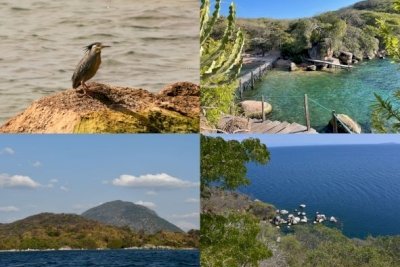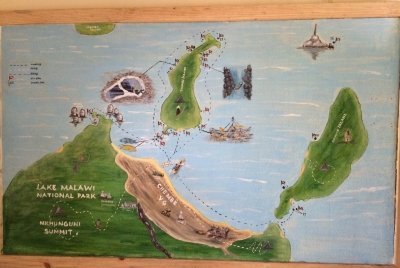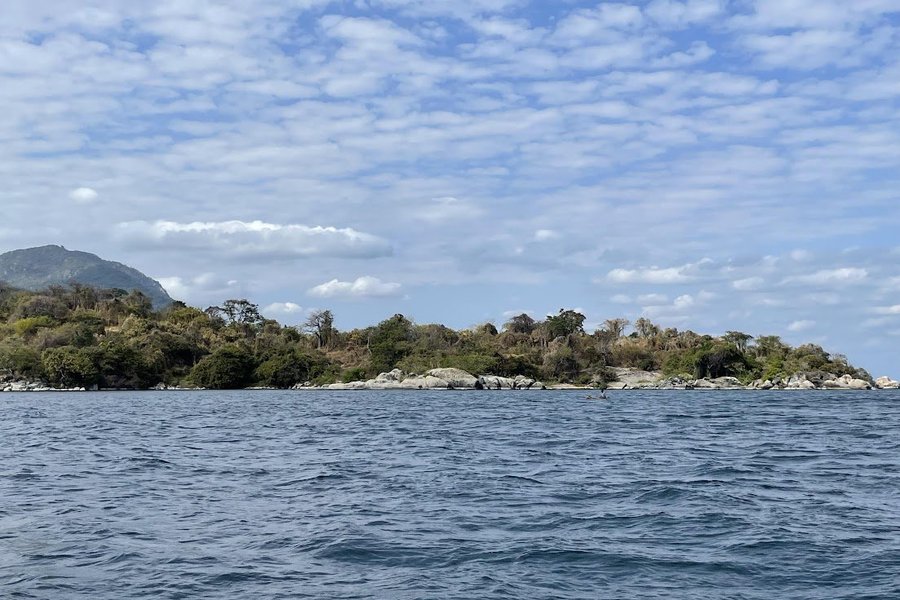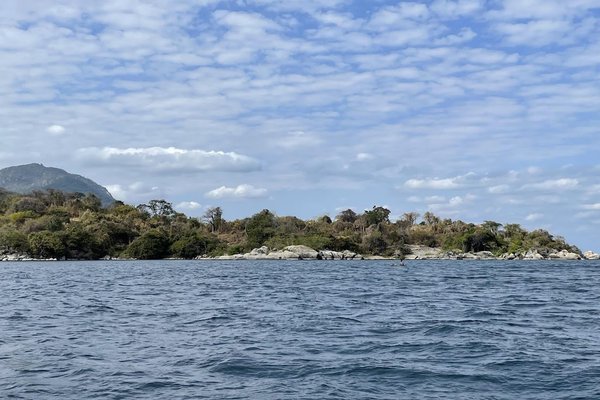Malawi
Lake Malawi
Lake Malawi National Park holds over 500 fish species (over 90% endemic), which makes it a key example of specialized evolution.
Most noteworthy among the fish are the cichlids (rockfish), with 345 species endemic to the park, which are an object for scientific study because of their rapid increase in species diversity. With its Rift Valley escarpment backdrop, this freshwater lake also is of exceptional beauty. The lake is the third largest and second deepest lake in Africa.
Community Perspective: for starters, the core zone only covers the southern part of Lake Malawi, including Cape Maclear Peninsula. From Cape Maclear you can arrange snorkeling trips “to see the beautiful variety of fish that gather in the rocks just off the nearby islands as well as Otter Point at the far end of the park”. Catamaran trips to see the rockfish and diving excursions are also on offer. The lodge on remote Mumbo Island comes recommended.
Site Info
Official Information
- Full Name
- Lake Malawi National Park (ID: 289)
- Country
- Malawi
- Status
-
Inscribed 1984
Site history
History of Lake Malawi
- 1984: Inscribed
- Inscribed
- Type
- Natural
- Criteria
- vii
- ix
- x
Links
- UNESCO
- whc.unesco.org
- Official
-
- visitmalawi.mw — Visit Malawi
- Related
-
- web.mit.edu — Link
- users.pandora.be — Link
All Links
UNESCO.org
- whc.unesco.org — whc.unesco.org/
Official Website
- visitmalawi.mw — Visit Malawi
Related Resources
- web.mit.edu — Link
- users.pandora.be — Link
News Article
- Feb. 22, 2023 fairplanet.org — Conservationists in Malawi are protesting against a water project inside Lake Malawi National Park
- July 5, 2022 news.mongabay.com — Construction begins on controversial water project inside Lake Malawi National Park
- Dec. 17, 2015 malawi24.com — Malawi government is still undecided on whether to explore oil or not in Lake Malawi.
Community Information
- Community Category
- Natural landscape: Rivers, Wetlands and Lakes
Travel Information
Recent Connections
-
Named after a Lake
Lake Malawi -
Misleading WHS Names
The WHS uses the same scoping as the Na… -
Country named after them
The lake was originally named "Nyasa" b…
Connections of Lake Malawi
- Individual People
-
-
David Livingstone
The first westerner to discover Lake Malawi
-
- Geography
-
-
Zambezi basin
-
Lakes located in Rift Valleys
Great African Rift Valley (Western Rift Valley) -
Notable lakes
30,044 km?
-
- History
-
-
Iron Age
Archaeological evidence points to a long period of human occupation with sites dating back to the Iron Age in the 4th century. (AB ev)
-
- Ecology
-
-
Swamps and Marshes
"Habitat types vary from rocky shorelines to sandy beaches and from wooded hillsides to swamps and lagoons." (OUV) -
Elephants
African elephant (occasionally coming down to the lake) -
Ancient lakes
-
Crocodiles
-
Hippos
"Mammals include hippo (particularly in the Monkey Bay area)" (AB ev) -
Strepsirrhini
brown greater galago -
Fish
Crit x "up to c.1000 species of fish, half occurring within the property: estimated as the largest number of fish species of any lake in the world. Endemism is very high: of particular significance are the cichlid fish, of which all but 5 of over 350 species are endemic. The lake contains 30% of all known cichlids species in the world" -
Notable examples of multiple speciation in one site
Cichlids -
High-Biodiversity Wilderness Area
Miombo-Mopane woodlands and savannas
-
- Damaged
-
-
Threatened by Oil and Gas Exploration
"Offshore oil exploration activities have commenced in the northern part of the Lake... Although this is some distance from the World Heritage property it presents the risk of oil and other pollutants spilling into the lake, which would have far-reaching consequences. In late 2013, a second oil concession was awarded, which covers the southern part of the lake, including the entire property. .. More recently, Hamra Holdings Inc. has been licensed to explore for oil in the lake until 2022." (IUCN Outlook 2020) -
Poaching
Fish poaching
-
- World Heritage Process
-
-
Perfect Inscriptions
1984 -
First inscriptions
Malawi 1984
-
- Human Activity
-
-
Slavery
"Cape Maclear area was one focal point in the ivory and slave trade era"
-
- WHS on Other Lists
-
-
Biodiversity hotspot
Eastern Afromontane
-
- Timeline
-
-
Early Pleistocene
It is variously estimated at about 40,000 years old or about one to two million years. (Wiki)
-
- WHS Names
-
-
Country named after them
The lake was originally named "Nyasa" by David Livingstone probably for the generic word for "Lake" in several local languages (e.g as in "Victoria Nyanza"). Exactly how/when/why it became changed to "Lake Malawi" is unclear. One "legend" is that "the Name derives from the native word meaning 'flaming water' or 'tongues of fire' believed to have been used to describe the dazzling reflections of its huge Lake Malawi"! Another is that Dr Hastings Banda chose it himself having seen "Lac Maravi" on an early French map of Afrique Sud (which was not however the same lake as that which became "Nyasa"). The lake was then so named by him alone and the country was named after it. A third possibility is that the country derives its name from the "Maravi", a Bantu people who came from the southern Congo about 600 years ago and that in fact the lake was renamed after it! To this day both Tanzania and Mozambique continue to call the lake "Nyasa" or "Niassa". The former possibly in order to avoid conceding Malawi's primacy in a dispute over the partition of part of the lake between the 2 countries! -
Named after a Lake
Lake Malawi -
Misleading WHS Names
The WHS uses the same scoping as the National Park, but both cover only the southern part of the lake; so Southern Lake Malawi might have been a better name.
-
News
- fairplanet.org 02/22/2023
- Conservationists in Malawi are pro…
- news.mongabay.com 07/05/2022
- Construction begins on controversi…
- malawi24.com 12/17/2015
- Malawi government is still undecid…
Recent Visitors
Visitors of Lake Malawi
- Ali Zingstra
- A. Mehmet Haksever
- Artur Anuszewski
- Ask Gudmundsen
- Bill Maurmann
- Bram de Bruin
- Elf21
- Emili Xaus
- Erfe91
- Eva Kisgyorgy
- Felicité
- Iain Jackson
- Jarrod_Byham
- Jon Opol
- Joyce van Soest
- leckie118
- Liamps91
- Loic Pedras
- Luis Filipe Gaspar
- Maja
- Malgorzata Kopczynska
- Marlies van Wolfswinkel
- Martin
- Michael Ayers
- Paul Schofield
- Philipp Leu
- Randi Thomsen
- Roman Bruehwiler
- Sandra!
- Sclowitz
- stephhollett
- Svein Elias
- Thomas Buechler
- Thomas van der Walt
- Vanessa Buechler
- Wo_ko
- Zoë Sheng
- Александар Стојиљковић
Community Reviews
Show full reviews
July is a very good time of the year to visit this site. The temperature is simply perfect! Two nights on Mumbo Island, which is in the south end of the lake about one hour from Cape MacClear, is just an adventure. The Island has never been populated and is still in its natural state with a thick covering of miombo woodland and ancient fig and baobab trees. The island gives you a Robinson Crusoe feeling, unspoiled in the middle of “an ocean”.
The lodge is run by Kayak Africa, which have a lodge in Cape MacClear as well. The camp has 6-7 cabins which is down to earth, with simple cabins build of reeds, timber, thatch and canvas, bucket showers and eco-loos. The place has neither electricity, wifi or telephone service, but the personal service is impeccable!
What to do in such a remote place? There are activities like snorkelling, kayaking, hiking or just relaxing. But first, a dive into the water it’s a must. Lake Malawi is famous for its endemic cichlids. The small beach is iconic, and perfect for snorkelling. There are more than 500 different species of cichlids, and the bay is at great place to enjoy them.
There is a network of hiking trails perfect for exploring the island. The trails runs around the island and are perfect to enjoy the vegetation an the great views of Lake Malawi. There are lots of different birds, for instance we spotted several Fish Eagles …
Keep reading 0 comments
Lake Malawi was on my safari tour so I visited this without gunning for a WHS “tick” before I started travelling more frequently. The lodges at the shore are nice but shockingly poor villages surround the luxury. After arriving I asked about scuba diving and we arranged it for the next day. The same evening I went out on a lovely modern catamaran to see the rockfish. This is one of the main criteria of the OUV and I have to say that is worth it alone (I hate the outstanding beauty criteria). The your leta you feed them which is a bit controversial, with the guide grabbing them in his palm and letting you try the same...okay anyway you must do the sunset trip. The next day I went diving with a lovely instructor form the US who is basically doing charity. That means diving is cheap and especially the courses as most of the fees go to PADI. I would definitely do a course here if you want to save a lot of money. As for the two dives, the main attraction are the catfish drawing circles into the seabed. If you are lucky you see one performing the dance else you will most definitely find the rings as well as the catfish itself. Towards the end of the dive we cleaned up fishing nets which are a big problem here. That and from what I read there are oil reserves below the lake.
Definitely worth the …
Keep reading 0 comments
Supposedly, one of the first Europeans to see Lake Malawi, a Portuguese trader, said it was more like the sea and you can't argue with him when you view the lake from Cape McClear.
Getting to the UNESCO designated area of the lake is a little inconvenient. The crowded "scheduled" (i.e. when they are much more than full) buses or matolas, from various towns and villages only go to Monkey Bay, which is a spread out, bustling stretch of small wood shacks housing a variety of businesses and brick huts. Like most of Malawi, people are constantly on the move, mostly on foot or on bike. I didn't fine it very inviting.
Then you have to take some other form of transportation (taxi, pick up truck, motorbike taxi)for the additional 18 km to the Cape along a partially paved, mostly bumpy, dusty, dirt road that passes through some stunning African hillsides before you catch a glimpse of the lake. That takes about 45 minutes. Or, if time and comfort are important, (not knocking them) you can hire a car and driver from your jumping off place and cut down the travel time by more than half in some cases. (Four hours from Blantyre vs. ten or so by the matolas.)
There are several lodges at various prices at the Cape and they work together in a sort of cooperative so all the local merchants share the wealth. A person can actually sit on the lake shore and not be endlessly …
Keep reading 0 comments
Beautiful. Definitely recommend going with some guidance from a local. Have to be careful where you swim due to parasites. Went out in a boat to an island where we could see lots of small colourful fish and jump off a rock into the lake. An amazing day!
Keep reading 0 comments



